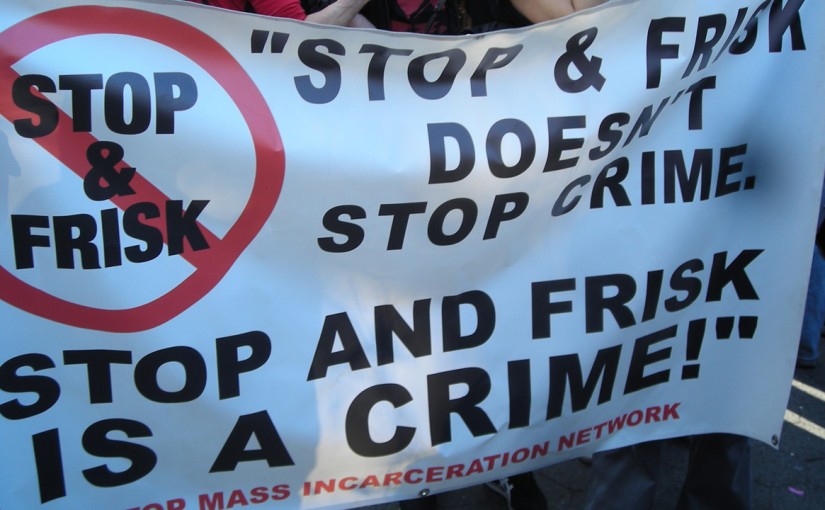NYPD's 'stop-and-frisk' Practice Unconstitutional, Judge Rules

 NEW YORK – A judge ruled on Monday the New York Police Department’s “stop-and-frisk” crime-fighting tactic unconstitutional, dealing a stinging rebuke to Mayor Michael Bloomberg, who had argued the practice drove down the city’s crime rate.
NEW YORK – A judge ruled on Monday the New York Police Department’s “stop-and-frisk” crime-fighting tactic unconstitutional, dealing a stinging rebuke to Mayor Michael Bloomberg, who had argued the practice drove down the city’s crime rate.
U.S. District Judge Shira Scheindlin called it “indirect racial profiling” because it targeted racially defined groups, resulting in the disproportionate and discriminatory stopping of tens of thousands of blacks and Hispanics while the city highest officials “turned a blind eye,” she said.
“No one should live in fear of being stopped whenever he leaves his home to go about the activities of daily life,” Scheindlin wrote in her opinion.
Danny Ortega, a Phoenix civil rights attorney, commented on Facebook that he supported the court’s ruling. He argues that racial profiling by police must stop.
“Racial profiling has to stop!! It is being used in epidemic proportions throughout the country. Sheriff Arpaio is the poster child for this dehumanizing practice because he barks the loudest through the media, but we need to fight against it with all police departments,” Ortega wrote. “The police are supposed to protect our freedoms and not violate our constitutional rights! White skinned people don’t see a problem with racial profiling because they are not subjected to it…Our only protection is through the courts and victims need to come forward to stop this …discriminatory practice!”
As part of her ruling, Scheindlin ordered the appointment of an independent monitor and other immediate changes to police policies. Her “remedies” address two lawsuits, one brought by the New York Civil Liberties Union (NYCLU) and the other by the Center for Constitutional Rights.
“Today is a victory for all New Yorkers,” the Center for Constitutional Rights said in a statement. “After more than 5 million stops conducted under the current administration, hundreds of thousands of them illegal and discriminatory, the NYPD has finally been held accountable. It is time for the city to stop denying the problem and work with the community to fix it.”
Bloomberg has resisted interference in his police policies, especially that of stopping, questioning and frisking anyone for “reasonable suspicion” in high-crime areas.
The mayor has sought to preserve a legacy that includes a 30 percent reduction in violent crime since 2001, the year he was first elected. Bloomberg will step down on January 1 after 12 years in office.
The judge, who presided over the 9-week trial without a jury, ruled the effectiveness of “stop and frisk” was irrelevant.
“Many police practices may be useful for fighting crime -preventive detention or coerced confessions, for example – but because they are unconstitutional, they cannot be used, no matter how effective,” the ruling said.
Police officers felt pressure to increase the number of stops after Bloomberg took office in January 2002 and brought in Raymond Kelly to be NYPD commissioner, the judge wrote.
As a result, officers often frisked young minority men for weapons or searched their pockets for contraband before letting them go, in a violation of the Constitution’s Fourth Amendment that protects against unreasonable searches and seizures, the judge said in her 195-page decision.
RISING NUMBER OF POLICE STOPS
The number of stops rose to 685,724 in 2011 from 160,851 in 2003, with about half resulting in physical searches, a 2012 report by the New York Civil Liberties Union showed.
In 2011, there were more frisk searches of young black men than the total number of such men living in the city, the report found.
Only 1.8 percent of blacks and Latinos searched by the police in 2011 had weapons on them, compared with 3.8 percent of whites, the NYCLU report said.
Bloomberg and Kelly countered that the practice has driven down violent crime and limited the number of illegal guns being carried on the streets.
Homicides fell from 649 in 2001 to 419 in 2012, the lowest number since records have been kept. Other major felonies have fallen by similar proportions.
Bloomberg and Kelly were due to hold a news conference later on Monday.
The judge selected as the monitor Peter Zimroth, 70, a partner at Arnold & Porter who worked as the city’s top lawyer from 1987 to 1989.
Scheindlin said Zimroth’s powers would be restricted to overseeing changes to stop and frisk and will not supplant those of the police commissioner.
The judge also ordered the NYPD to adopt a written policy specifying circumstances where stops are authorized; adopt a trial program requiring the use of body-worn cameras in one precinct in each of the city’s five boroughs; and to set up a community-based remedial process under a court-appointed facilitator.
The city council also has defied Bloomberg by passing two laws in June. One creates an independent inspector general to monitor the New York Police Department, and the other expands the definition of racial profiling and allows people who believe they have been profiled to sue police in state court.
(Reuters)














